UNCDF Webinar series: Will the Coronavirus pandemic affect municipal finance investment projects?
Tags
“After all, Local Government Finance is Development Finance and the pandemic has taught us not only who are the true essential workers, but what are the essential public institutions for our collective common good.”
David Jackson, Director,Local Development Finance, UN Capital Development Fund.
UNCDF held a Webinar on Thursday July 2nd that explored how the Coronavirus will affect municipal finance investment projects.
CLICK HERE TO LISTEN TO THE WEBINAR
To listen enter the following Password: 5s.a375b
READ A SUMMARY OF THE WEBINAR BELOW
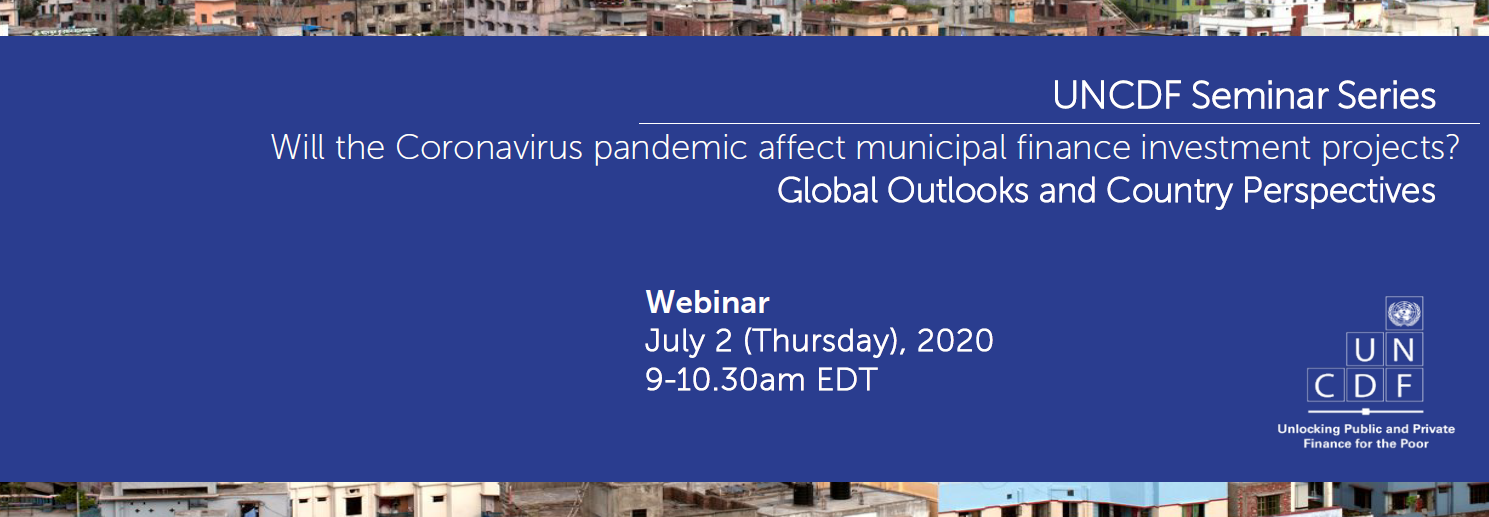
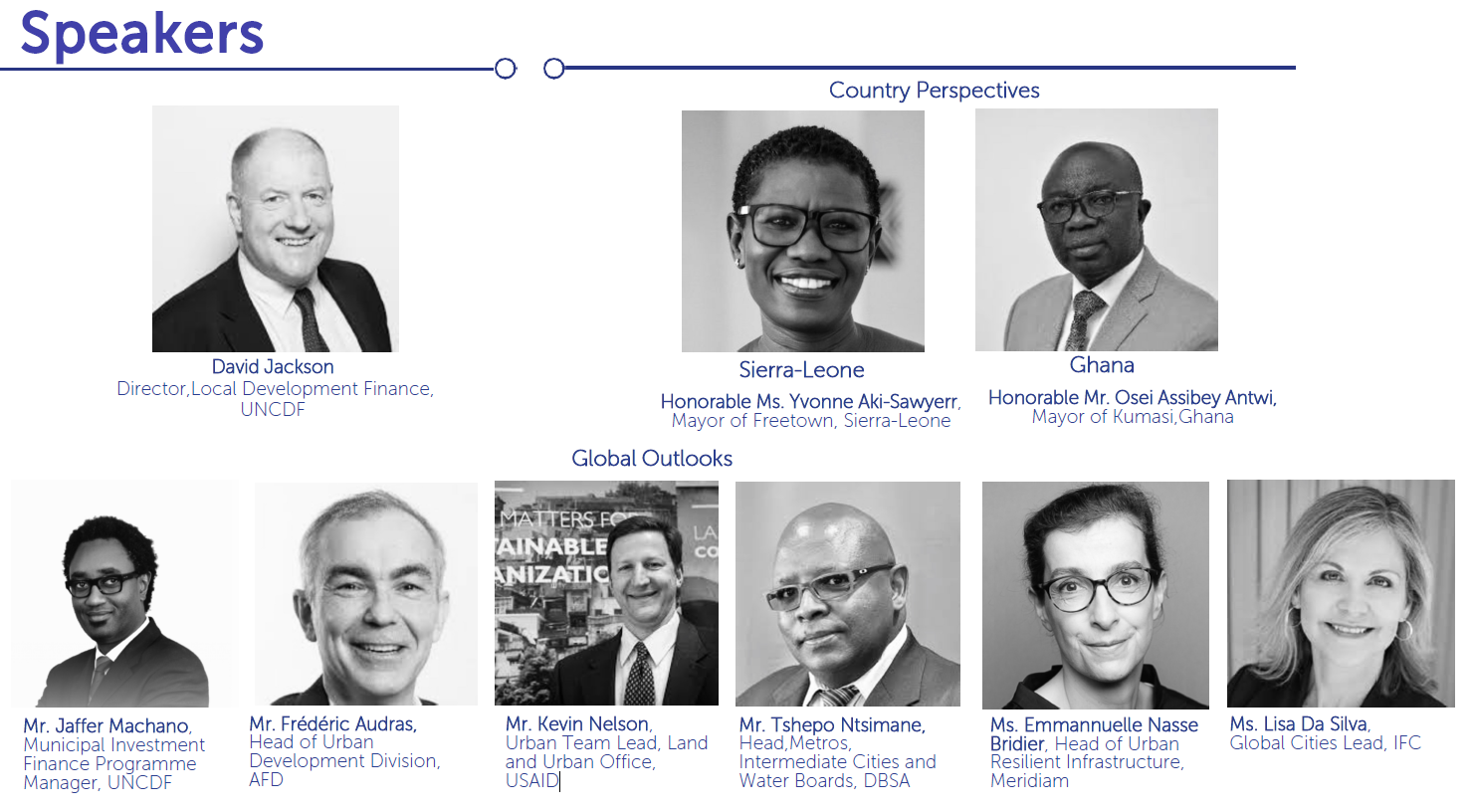
David Jackson Director, Local Development Finance, UNCDF - Introduction
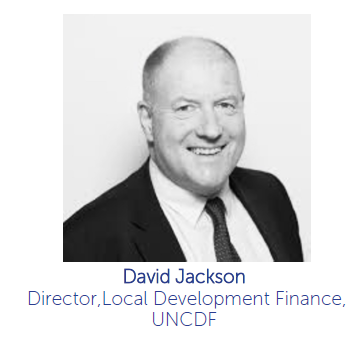
David Jackson stated that the session will focus on looking ahead beyond the immediate pandemic at the investment horizon of the next 24 months. He stated that
“in this world of reduced fiscal space, reduced local receipts, reduced local tax revenue, sometimes reduced local transfers from central government to local government and reduced economic activity there is a need to rebuilt all of these. In the meantime urbanization is not going to slow down specially in sub-Saharan Africa. This Webinar will explore the investment climate of the moment.”
“Urbanization continuing at a very rapid rate, Africa should no longer be thought of as a rural continent, African cities are growing, especially intermediary cities.”
“Africa requires the Investments to make sure that is urbanization is accompanied by increases in productivity, increases in livelihood and increases in the quality of life as well as environmental sustainability so that it can be the springboard to an environmentally sustainable, livable, healthy and prosperous continent.”
That is the challenge of Municipal Finance, of Local Government Finance, of investment finance in urban areas in Africa. This is the challenge we are taking on. The pandemic is here to stay and has affected our work. We will have perspectives from Mayor’s and investors on the investment climate, and how the COVID pandemic has affected their pipelines, what practical measures and policy guidelines are required, and more…”
He then introduced the Mayor’s who provided introductory remarks…
Mayor of Kumasi- Honorable Mr. Osei Assibey Antwi, Mayor of Kumasi, Ghana
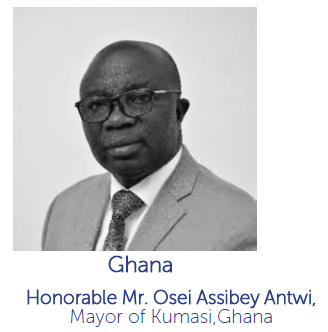
Kumasi is strategically located in Ghana, everyone having to go the northern part of the country has to go through Kumasi, people coming from Burkina Faso, Ivory Coast are going to the city.
Every day more than 1,5 million people are adding up to the already congested number of inhabitants that transit and rest in the city.
The hotel business has been helping us a lot economically, the hospitality industry was booming, the number of hotels in Kumasi outnumbers the number of hotels in Accra the capital City.
Kumasi is home of the largest market in West Africa and is the oldest city in Ghana, it has always been a place of business and transit and commerce since more than 300 years
COVID-19 has really affected Kumasi, all the regions around are not bringing trade anymore , the borders are closed , the trade has dropped down significantly , items coming from Nigeria, Ivory Coast, Ghana, Burkina Faso , import /export and trade links have diminished every source of revenue of the city.
Kumasi generates revenue from business operating permits, property rates, and fines and taxes it applies on the trade, these are our internal general funds and then from the central government support via the common fund which is drastically down.
Since COVID-19, the budget is down 30%, ($2 million are not available anymore) and this has affected all our projects.
The Central government has assisted us in getting funds of several million Euros which are used for the completion of a market, this project is ongoing, but another project of $20m has been stalled. We are the only city in Ghana which has benefited from that help from the central government.
More than 15 % of the expenditures are spent on COVID related issues, the central government is really constrained too and can’t provide a lot a support, most of its funding is now dedicated to health issues. Municipal funding is very important for us and we want to insist on the importance of it, we are in process to be able to borrow soon and this will change a lot of things for Kumasi.
Honorable Ms. Yvonne Aki-Sawyerr, Mayor of Freetown, Sierra-Leone
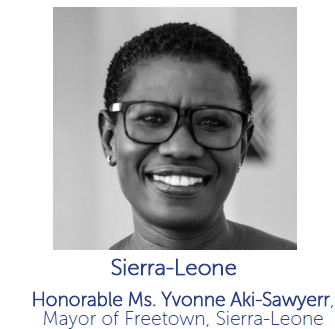
Mayor Yvonne presented the fiscal challenges that Freetown has been facing. Overall the investment climate in the city has been hard hit by the pandemic. There has been a shift in donor related funding from traditional projects to COVID-19 focused activities. For example, with limited funding from partners and private sector, Freetown has developed a comprehensive plan providing direct support for communications, preventive measures and community care.
However, the two main revenue sources – fiscal transfers from central government and own source revenue have experienced a significant downturn. The city has not received any Inter Governmental Fiscal Transfers at all this year and traditional Own Source Revenuewhich mainly came from property rates has been lost. She gave an example of Freetown’s innovation in digitizing their property rate system, geo mapping the entire city and building an automated point-based system linking into the banking system, which ensures transparency and accountability. The system allows the identification of payments made by wards and allows residents to participate in determining how the 20% of the revenue raised in the wards would be used. But one challenge the city faced was to issue property rate demand notices in this difficult time. She stressed the importance of support from the political leadership of the national government.
In summary, Mayor Yvonne made the point that the local challenges are also a national priority. During and post COVID-19 time, the most important element that needs to be elevated is the ability for cities to access financing without having to go through national government, whether it is financing from development partners or putting in place a structure or legislation that allows cities to make decisions. Cities need flexibility and assurance that cities who make commitments to deliver services as part of the leadership campaign have access to finance.
David Jackson then moved to question the panel members.
Question to Jaffer Machano
Jaffer, you are heading the technical assistance facility for the International Municipal Investment Fund you began doing this before the COVID-19 pandemics struck. Are you worried now that you're not going to have enough projects to provide to Emanuelle Nasse Bridier (fund manager from Meridiam) when the fund is capitalized?
Jaffer Machano Municipal Investment Finance Programme Manager, UNCDF
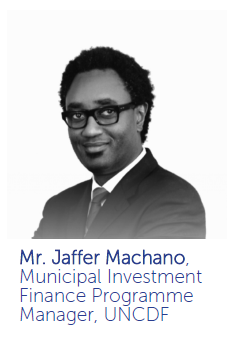
Jaffer Machano:
To the contrary ,what we are seeing from our discussions with cities is exactly what the mayors have described the need for investment continues and the projects are there and we are on the ground in both of these cities in Freetown and in Kumasi but the challenges to market have been complicated.
One of the major issue of course for sub-Saharan Africa is that the sub sovereign market technically doesn't exist outside a few pockets like South Africa, Egypt and to some extent Mauritius.
This is why the legislation that the Mayor of Kumasi has mentioned that it's in advanced stages for Ghana will be revolutionary for Ghana because that will allow for capital to circulate ,as the Mayor of Freetown has suggested and go directly to the cities in order to be consumed in line with the needs of social services. I am not worried in terms of projects but I'm worried in terms of the route that projects will have to pass to bankability and access to capital
Emmanuelle Nasse Bridier: Head of Urban Resilient Infrastructure, Meridiam
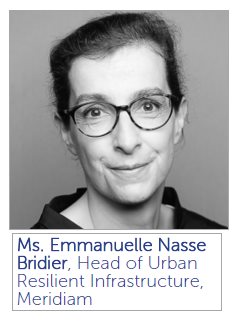
There is a good news, we have seen an increasing appetite and interest for infrastructure at a city level , clear willingness of private sector to be involved in the financing of what matters for the cities.
The investment industry have a clear understanding and realize the need to invest much more at the city level and in infrastructure to cover the needs of the population.
We are seeing this trend in surveys too , investors are increasing allocations to infrastructure, but now the investment community needs to find a way to invest in projects which make sense for the cities but which are also which are bankable and valuable. How to find projects which can cover the needs of the population while contributing to the economy and recovery and that attracts private sector investors to provide investment capacity despite the perceived risk.
We need to find solutions that involved blended finance and crowd-in additional counterparties with their capacity to take the risk and to fuel the source of funding while covering the risks that private sector investors cannot take.
This is a matter of cooperation, preparation and working all together to fuel the capacity to crowd in private investors
Overall, we have a long list of project, financial solutions and innovation and we are optimistic on the capacity to find solutions because the need is urgent and there is existing funding capacity to be deployed.
Mr Frederic Audras : Head of Urban Development Division, AFD
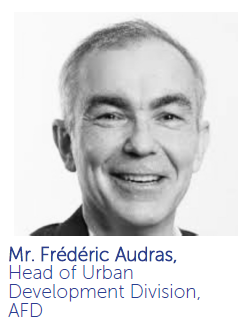
In 2008 AFD financed directly the city of Dakar without any guarantee from the national treasury and it worked, its was an innovative experience, we did an evaluation of this project financing and it was well evaluated.
After this crisis its really hard to present to a bank board or credit committee to present a new financing project, even it concerns a very important city
We are thinking of developing new guarantee instruments to encourage local banks to address the needs for finances of local authorities investment programs, to mobilize more financing resources for public infrastructure specially in Africa .
We are launching a partnership with the EU to this effect.
This initiative (Cityriz) aims at creating or developing domestic lending markets for local governments in Africa. Cityriz consists of partial guarantee on loans extended to local governments by domestic banks, with the purpose of channeling more financial resources to these entities that are so far underserved by the banking sector.
Cityriz will also lead to longer maturities and better interest rate offered by banks to local governments so that the latter can more easily fund their infrastructure needs such as roads rehabilitation, drainage, economic and social infrastructure, schools, health centers, public space, water supply, sanitation and solid waste management, etc. Priority will be given to investments with climate co-benefits.
The guarantee mechanism will also go with a technical assistance meant to help banks to develop internal tools and processes to address the local government market in Africa.
Targeted loans under CITYRIZ is €100M over the next four years.
Mr. Tshepo Ntsimane, Head, Metros, Intermediate Cities and Water Boards, DBSA
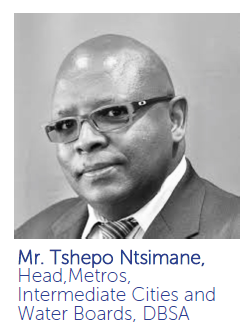
Tshepo highlighted the need for collaboration between domestic financial institutions and international development financing institutions given the impact of COVID-19. The recent sovereign downgrade of South Africa has made it difficult for DBSA and municipalities in South Africa to raise cost-effective funding for much needed urban infrastructure funding. There is a huge need to collaborate with good and strong rated international agencies such as AFD, AfDB, and IFC, which can reduce the cost of funding infrastructure in South Africa.
Furthermore, he stated that DBSA as the largest lender in municipal space in South Africa, its funding comes from domestic bond issuance and borrowing from commercial banks and international DFI partners. Following Johannesburg’s pioneering example, there are now 4 cities in South Africa that have issued municipal bonds. DBSA has been working to partner with government and private sector to increase private investment in municipal infrastructure to lengthen the maturity profile and deepen the capital markets. DBSA also works with international partners and institutional investors to bring credit enhancement into the domestic market to promote private sector participation in the market.
Mr. Kevin Nelson, Urban Team Lead, Land and Urban Office, USAID
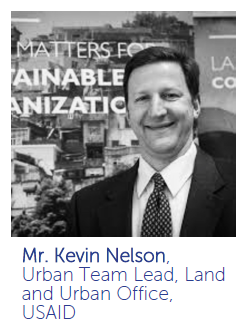
Kevin stressed the connection of Own Source Revenue and investment from the perspective of USAID’s shift programmatically and operationally. He first talked about the connectivity between financing and public policy that guides service delivery. In the context of COVID-19, USAID has been focusing on linking urban planning and public health needs as part of the COVID-19 24-month response. From the angle of social contract and innovative development finance, they highlight the role of Own Source Revenue in the urban service delivery model. There has been greater articulation in connecting governance and USAID’s support in policy advisory to enhance cities’ financing self-reliance, specifically in terms of Own Source Revenue and domestic resource mobilization. For example, USAID is implementing a project in Ethiopia supporting local government in home grown economic growth strategy. He also underlined the importance of building a vicious cycle of investing in SMEs using guarantee mechanisms so that they can invest back into revenue streams. One example is a solid waste management project in Southeast Asia, which capitalizes on a fund of US$150 million. It will not only promote local business growth, but also drive city’s economic development.
Ms. Lisa Da Silva, Global Cities Lead, IFC
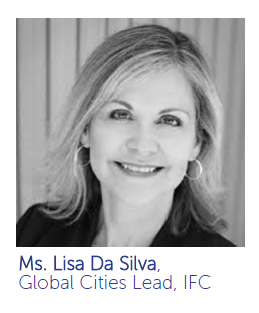
Lisa concluded the panel discussion by emphasizing that post-COVID-19 municipal investments will take different forms with different stakeholders in each city. COVID-19 is impacting municipal finance heterogeneously, depending from the revenue base and level of fiscal autonomy. It is expected to see a significant reduction of availability of funding and a scale back in capital expenditure. With a very limited budget next year, cities have to be strategic about investments and there is no one-size-fits-all solution for local governments. Furthermore, she suggested that cities can explore new streams of revenue such as fees for tech-based services. Where regulations allow, responsible fiscal decentralization should be promoted, which will allow cities for borrowing or PPPs.
In addition, governance and risk diversification are two important aspects of local government finance. Governance is important for creating ways to mobilize resources and for building economic resilience and financial strengths. Risk diversification will provide comfort for domestic financial institutions and mitigate loss. She also stimulated thinking around land value capture opportunities. How can cities partner with private sector in projects? How can cities become an investor and contribute land as part of a project and share revenue stream of the project over a longer time. In conclusion, resilience and green economic recovery is what investors look for.
Summing up David Jackson committed UNCDF to work with the panelists on the policy and structural reforms required for a global financial ecosystem that works for cities and local governments, which becomes more critical in the light of the current pandemic and its recovery. After all, Local Government Finance is Development Finance and the pandemic has taught us not only who are the true essential workers, but what are the essential public institutions for our collective common good.
About UNCDF
The United Nations Capital Development Fund (UNCDF) makes public and private finance work for the poor in the world’s 47 least developed countries. With its capital mandate and instruments, UNCDF offers “last mile” finance models that unlock public and private resources, especially at the domestic level, to reduce poverty and support local economic development.
UNCDF’s financing models work through three channels: (1) inclusive digital economies, which connects individuals, households, and small businesses with financial eco-systems that catalyze participation in the local economy, and provide tools to climb out of poverty and manage financial lives; (2) local development finance, which capacitates localities through fiscal decentralization, innovative municipal finance, and structured project finance to drive local economic expansion and sustainable development; and (3) investment finance, which provides catalytic financial structuring, de-risking, and capital deployment to drive SDG impact and domestic resource mobilization.
By strengthening how finance works for poor people at the household, small enterprise, and local infrastructure levels, UNCDF contributes to the Sustainable Development Goals—SDG 1 on eradicating poverty and SDG 17 on the means of implementation. By identifying those market segments where innovative financing models can have transformational impact in helping to reach the last mile and address exclusion and inequalities of access, UNCDF contributes to a broad diversity of SDGs. Visit us at www.uncdf.org, follow @UNCDF and subscribe for updates at bit.ly/2wwDiqs